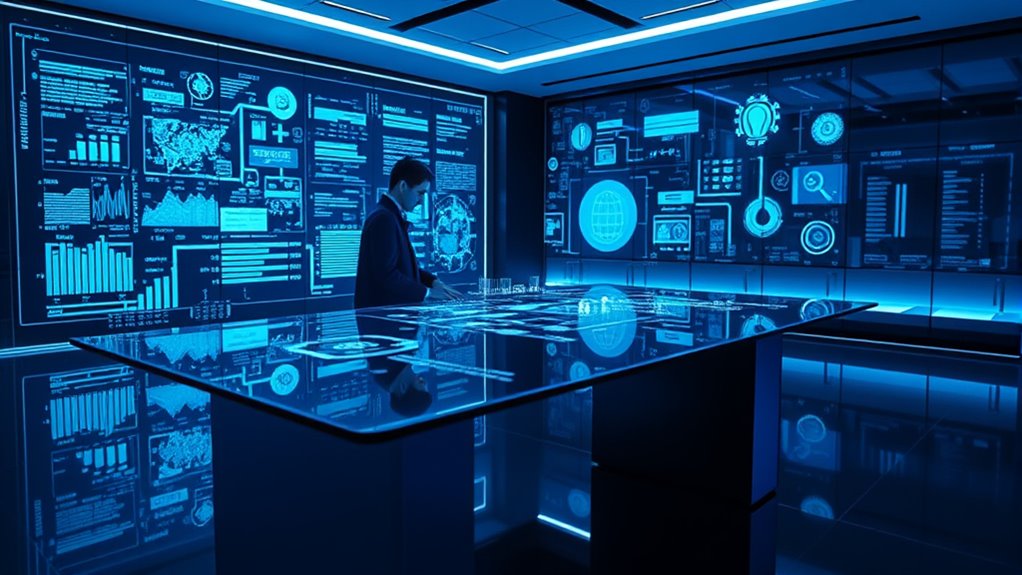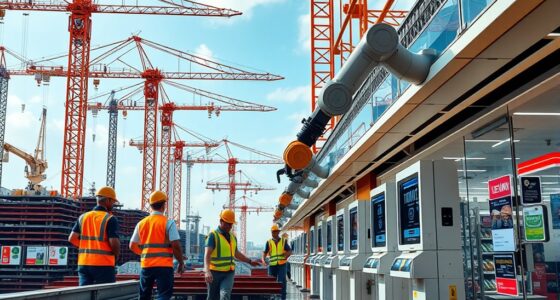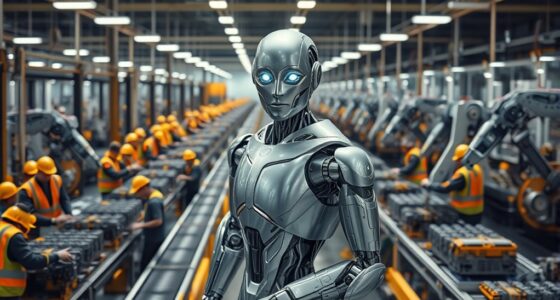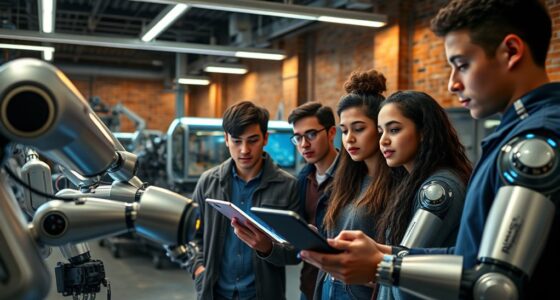In cyber-physical jobs, you work alongside smart algorithms that act as your supervisors, controlling physical systems through digital signals. These roles involve designing, maintaining, and troubleshooting automated systems that rely on sensors, real-time data, and machine communication. Your tasks focus on ensuring seamless interaction between hardware and software to optimize safety, efficiency, and productivity. If you keep exploring, you’ll uncover how these smart systems are transforming industries and creating new career pathways.
Key Takeaways
- Cyber-physical jobs involve systems where algorithms control and optimize physical operations in real time.
- Employees work alongside intelligent systems that act as automated supervisors or decision-makers.
- Roles include designing, maintaining, and troubleshooting algorithm-driven automation and control systems.
- Workers must understand both hardware and software to collaborate effectively with algorithmic bosses.
- These jobs emphasize adaptability and continuous learning as algorithms increasingly influence workflows.
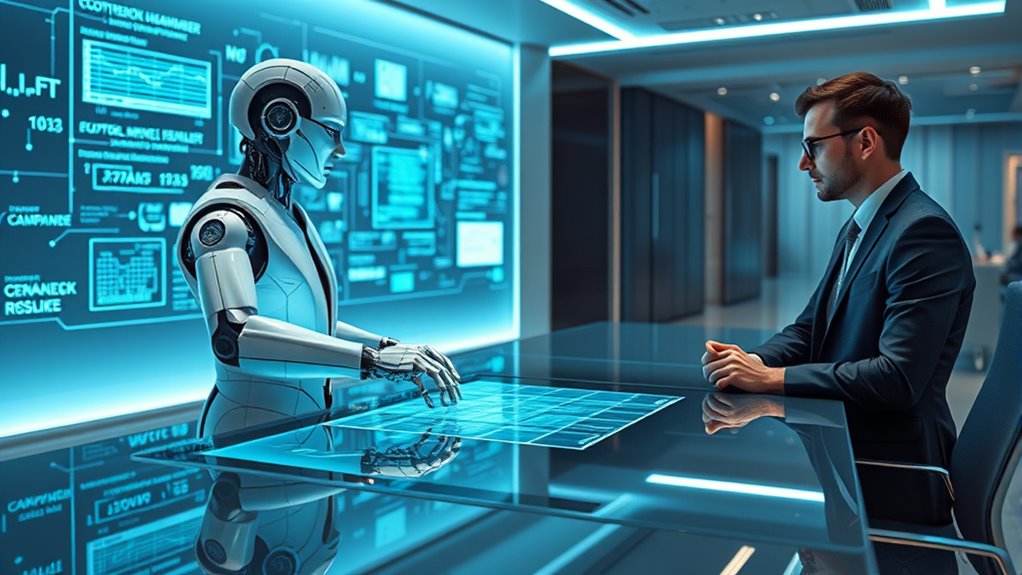
Cyber-Physical Jobs are transforming industries by integrating digital technology with physical systems to create smarter, more efficient operations. You’ll find yourself working alongside sensors, algorithms, and machines that communicate constantly, making decisions in real time. As a CPS engineer, you might be responsible for designing systems that automate manufacturing lines, guaranteeing seamless coordination between hardware and software. You’ll integrate sensors and control algorithms to enhance performance and respond instantly to changing conditions. Your role involves not just coding but also understanding mechanical systems, so you can develop solutions that improve productivity and safety. Operational technology (OT) systems are fundamental in ensuring these cyber-physical systems function reliably and securely in industrial environments. If you’re a Digital Twin Architect, your job is to craft virtual replicas of physical systems, like factory robots or energy grids. You’ll simulate scenarios, test modifications, and analyze data without disrupting actual operations. Think of it as creating a digital double that helps you predict failures, optimize maintenance schedules, and streamline processes. Your work allows industries to save costs, reduce downtime, and boost overall efficiency. Meanwhile, IoT/IIoT Integrators connect devices—industrial sensors, machines, and control units—using low-latency networks. You’ll ensure these devices share data reliably and securely, enabling smarter decision-making and automation. Your expertise keeps operations running smoothly by maintaining these interconnected systems and troubleshooting issues as they arise. Embedded System Developers focus on low-level coding, firmware, and hardware interfaces. You’ll write the software that controls robotics, automation devices, and other machinery. Your work ensures precise, responsive operation, often in environments where milliseconds matter, like robotic arms or surgical tools. You’ll need to understand both software and hardware intricacies, so your solutions can be embedded directly into physical systems to achieve ideal performance. In manufacturing, factory automation managers monitor IIoT networks, overseeing connected machinery to prevent faults and optimize workflows. Your role is crucial in maintaining continuous, high-efficiency production lines, often relying on real-time data analytics. In all these roles, your work revolves around creating, maintaining, and improving cyber-physical systems that act as the brain behind physical operations. The boss isn’t a person but a complex network of algorithms and sensors that adapt and respond to real-world conditions. Your expertise ensures these systems are reliable, secure, and efficient. As industries increasingly adopt automation and smart technologies, your role becomes more significant. You’ll be at the forefront of a digital revolution where your skills directly impact manufacturing, transportation, energy, healthcare, and beyond. Your job is essential in shaping a future where industries operate with unprecedented precision, safety, and sustainability—all driven by the seamless integration of digital and physical worlds. Additionally, understanding system integration is vital for creating cohesive and functional cyber-physical systems that operate seamlessly across different platforms and devices.
Frequently Asked Questions
How Will Job Security Change With Algorithm-Managed Workplaces?
Job security will become more uncertain as workplaces rely heavily on algorithms. You might face constant monitoring and micromanagement, reducing your autonomy and increasing stress. Tasks could be automated, risking displacement, especially for routine roles. However, opportunities will also emerge for those who upskill in AI-related skills and adapt to new roles. Staying informed, continuously learning, and understanding how algorithms influence your work can help you maintain job stability.
What Skills Are Most Valuable in Cyber-Physical Job Environments?
You need skills that blend tech and physical systems in today’s workplace. Focus on managing cloud infrastructure, automating with DevOps tools, and securing hybrid environments through Zero Trust models. Master AI/ML integration and IoT security to stay ahead. Your ability to analyze threats, script for automation, and troubleshoot physical devices makes you invaluable. Adaptability and cross-domain knowledge guarantee you thrive in environments where algorithms guide operations and decision-making.
Can Humans Override Algorithm Decisions in Critical Situations?
Did you know humans override algorithms in critical decisions up to 30% of the time? In high-stakes situations, you can indeed step in, especially when algorithms face unfamiliar or ambiguous scenarios. Your judgment remains essential to guarantee fairness and accuracy. By actively monitoring and overriding when needed, you help balance automation’s efficiency with human values, safeguarding against errors and unintended consequences.
How Do Ethical Concerns Impact Algorithm-Driven Management?
You’re concerned about how ethical issues influence algorithm-driven management. As you rely on these systems, you might worry about biases reinforcing societal prejudices, leading to unfair treatment and inequality. Transparency gaps can obscure decision processes, making accountability difficult. Privacy risks from mass data collection and surveillance threaten personal rights. These ethical challenges can erode trust, harm employees, and deepen societal divides, requiring careful oversight and responsible AI use to guarantee fairness and respect.
What Industries Are Most Affected by Cyber-Physical Job Automation?
You might think only a few industries face change, but automation is revolutionizing entire sectors. Manufacturing, retail, logistics, and automotive industries are hit hardest, replacing millions of jobs with robots and AI. If you work in these fields, your job could vanish or drastically change overnight. Automation isn’t just a trend—it’s reshaping the workforce, forcing you to adapt or risk being left behind in a world where algorithms run the show.
Conclusion
As you navigate this digital landscape, remember that your job isn’t just a task—it’s a dance with an ever-evolving partner. Algorithms may guide your steps, but your human touch keeps the rhythm alive. Embrace the blend of machine precision and your unique creativity, for this new era isn’t about replacement; it’s about harmony. In the end, you’re the artist shaping a future where technology and humanity move in perfect sync.
